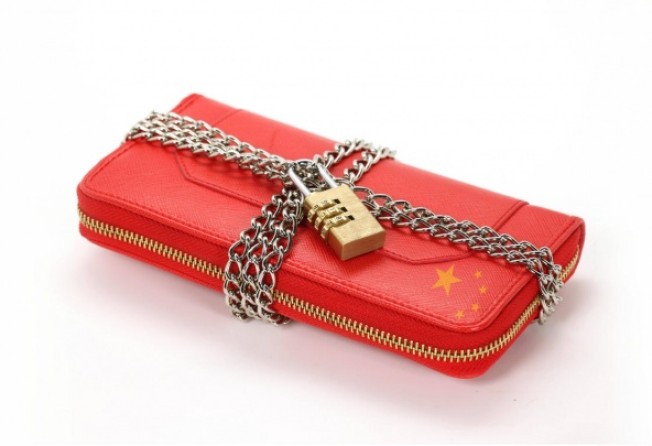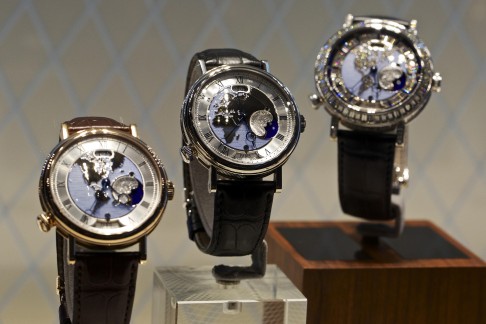Luxury brands blame slowdown on China's gifting crackdown
Luxury brands feel the pinch as the mainland reins in gift-giving to curb corruption, writes Abid Rahman

The normally upbeat world of luxury goods, buoyed by Chinese demand, has been a little more sober and serious in recent months as slowing earnings at fashion houses and watch ateliers make as many headlines as their latest collections.
Pessimists felt slightly vindicated late last year when Burberry shocked the markets halfway into the financial year with news that it expected 2012 sales and profits to slow and come in below expectations.
Hermès also gave everyone the jitters when it announced that its first-quarter growth in 2013 was the lowest since 2009, the height of the recession. The company's 10.3 per cent sales growth for the first three months of this year, driven in part by the popularity of Birkin bags in the mainland, was unexpected and it only partially masked the 5 per cent sales decline in its watch division.
The biggest luxury conglomerates, from LVMH to Kering (which owns labels such as Gucci and Balenciaga), Richemont and the Swatch Group (which owns Omega and Breguet, among others) all reported significant slowdowns.
The Federation of the Swiss Watch Industry (FH) has posted rosy headlines for years, and its industry report for 2012 was no different - Swiss watch sales grew 11 per cent overall. A closer look at the data, however, reveals some growing problems and a significant slowdown in two of the largest markets.
Hong Kong, the world's biggest export market for Swiss watches, was up only 7 per cent in 2012 and sales in the No 3 market - the mainland - rose an anaemic 1 per cent.
The real wake-up call came at the end of the first three months of this year, with the FH reporting that mainland sales were down a massive 26 per cent. Even the usually resilient Hong Kong market fell by 9 per cent, despite the traditional shopping frenzy during the Lunar New Year holidays.
To put those figures into context, the FH reported that total global watch sales grew 19 per cent in 2011, with Hong Kong experiencing 28 per cent growth and the mainland a whopping 49 per cent.The watch industry as well as some of the luxury leather and fashion brands blamed their woes squarely on Chinese government policy, specifically its crackdown on ostentation and luxury gift-giving as part of its anti-corruption campaign.
Burberry chief financial officer Stacey Cartwright was frank about the reasons behind the recent slowdown, telling investors that the gift-giving culture in China was a significant source of revenue. Cartwright's matter-of-factness contrasted with the near silence from watch companies, many of which were unwilling to speak on record - perhaps reflecting the increasingly Sino-centric nature of their business.
Luxury goods and watches have for many years been presented to government bureaucrats as a way to lubricate approvals for contracts or ease property and business negotiations. President Xi Jingping has even gone so far as to ban luxury advertising in state media.
Mainland netizens have been on full alert for local officials sporting expensive watches. A Shaanxi official, Yang Dacai, or "Brother Watch" as he was infamously labelled, was sacked last year due to his penchant for numerous expensive designer watches and other disciplinary issues.
The recent earthquake in Sichuan laid bare the fear of such scrutiny among officials, with many opting not to wear a watch in public, despite the obvious tan lines.
Fashion brands' response to this slowdown has been interestingly diverse.
Hermès CEO Patrick Thomas has described it as a "momentary" depression, and says the firm expects watch and leather sales to bounce back in the second half of this year as it believes the anti-corruption campaign will lose momentum.
Longines is one brand benefitting from the crackdown as officials look to more moderately priced luxury brands, trading down from more conspicuous brands such as Rolex and Patek Philippe.
The Richemont group is also betting big on a rebound in luxury watch sales on the mainland and Hong Kong by launching its Watches and Wonders exhibition, an Asian version of its SIHH watch fair, to be held in Hong Kong in September.
Hermès and Richemont's stay-the-course stance contrasts with the strategy adopted by other luxury groups such as LVMH and Kering, which are increasingly viewing their China retail operations as loss leaders and pure marketing in the short, medium and long-term.
"There has been a shift in the business from Asia to Europe," LVMH chief financial officer Jean-Jacques Guiony said on a conference call with investors and media in April 2012. A lower growth figure for LVMH in the mainland but not for the overall Chinese market could only be accounted for by overseas and tourist purchases, he said.
Steep commercial rents and high taxes in Beijing and Shanghai make luxury retail on the mainland a tough proposition. But brands believe Chinese elites' appetite for their products will remain strong, and these customers can still buy in Paris or London, where they will be beyond netizens' scrutiny and luxury goods taxes are lower.
Indeed, Guiony noted earlier that high taxes made Louis Vuitton products up to 47 per cent more expensive on the mainland than in France and up to 30 per cent higher than in Hong Kong.
After years of double-digit growth, luxury brands now realise Chinese demand is finite. Some hope the downturn is just a blip. The more proactive companies, though, see the beginnings of a trend and are preparing themselves for the impact.

